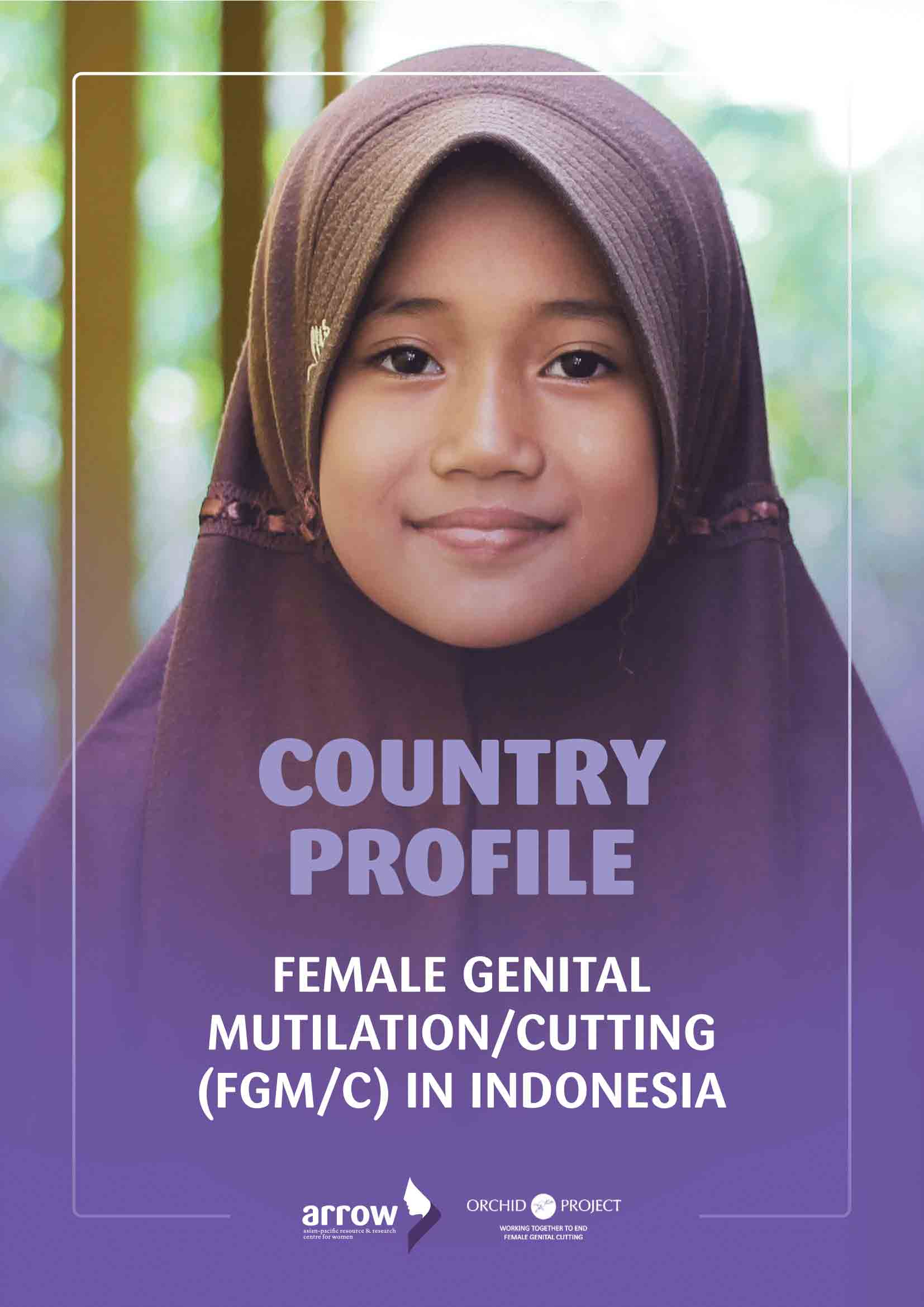Female Genital Mutilation/Cutting (FGM/C) is a recognised violation of human rights and a critical sexual and reproductive health concern. Globally, over 230 million women and girls have undergone the practice, with 4 million more at risk every year. In Asia, around 80 million women and girls are affected, and Indonesia accounts for the largest share, with at least 70 million. This country profile examines Female Genital Mutilation/Cutting (FGM/C) in Indonesia as part of a wider study on Southeast Asia. The research explores the prevalence, trends, drivers, norms, and barriers to change associated with the practice. The study includes detailed case studies conducted in specific communities within North Jakarta, East Jakarta, North Lombok, and Bandar Lampung, providing an analysis of sub-regional and community-level dynamics.
What does it include? Key findings
This report presents key findings on FGM/C in Indonesia, focusing on its prevalence, drivers, barriers to change, and opportunities for intervention, including sub-regional and community-level dynamics.
The report highlights that FGM/C remains widespread in Indonesia, with a national prevalence of 46.3% among women aged 15–49 as of 2024, affecting approximately 70 million women and girls of all age cohorts (from infants to older women) and 34.3 million women and girls aged 15-49. National prevalence has shown a slight decline from 50.5% in 2021, but rates remain alarmingly high among girls under 15, at 55%, suggesting the risk of resurgence.
The most common forms of FGM/C are WHO Type 1 (partial removal of the clitoris or clitoral hood) and Type 4 (pricking, piercing, incising, scraping), while symbolic practices such as cutting turmeric or cleansing with antiseptic are also widespread and culturally significant. More than 70% of girls undergo the procedure before the age of six months, often bundled with postnatal services in health facilities, reflecting a growing trend of medicalisation.
Decisions around FGM/C are typically made within households, with mothers and grandmothers playing central roles in perpetuating the practice. It is upheld by strong social pressure, marriageability concerns, and deeply embedded cultural and religious beliefs. Medicalisation has further normalised the practice, with midwives and healthcare providers carrying out nearly half of all procedures. Despite a 2024 government regulation banning FGM/C, community awareness of the ban remains low, and enforcement is weak.
However, the research found signs of openness to change, especially when people were informed that the practice is not a religious obligation. In conclusion, FGM/C in Indonesia remains highly prevalent and deeply entrenched, but there are also emerging opportunities for change.
Strategic Recommendations
Recommendations for Indonesia
- Establish Reliable, Comprehensive, Consistent and Standardised Data Collection
- Strengthen National Legal and Policy Implementation and Healthcare Regulation on FGM/C
- Promote Religious Re-interpretation and Engagement
- Invest in Community Education and Behaviour Change
Recommendations for the UK
- Support the Operationalisation of the 2025 Regulation Banning FGM/C in Indonesia
- Support Indonesian Civil Societies to advance Community-Level Awareness and Behaviour Change
- Support UN agencies’ programmes addressing FGM/C in Indonesia:
- Support and leverage Human Rights Mechanisms that call for the elimination of FGM/C
Regional Recommendations on Policy Priorities for Governments, Human Rights, and Development Partners
- Leverage the Beijing +30 and ICPD commitments, which explicitly call for the prohibition and elimination of FGM/C.
- Support regional platforms and align stakeholders to advance shared goals on gender equality and the elimination of harmful practices such as FGM/C.
- Leverage international human rights treaties to reinforce norms and standards that advocate an end to FGM/C, particularly CEDAW and CRC.
- Strengthen international and regional partnerships with agencies such as ASEAN, WHO, and UNESCO, and engage actively to ensure that FGM/C is integrated into broader gender equality and child protection agendas.
- Support regional medical and midwifery associations in developing and promoting professional guidelines that explicitly oppose the medicalisation of FGM/C.
Download the Country Profile here.
Conclusion
This report identifies potential avenues for engagement on FGM/C in Indonesia, leveraging international and regional forums, working with local actors, and supporting national initiatives. The recommendations are grounded in a nuanced understanding of the specificities and sensitivities of the national contexts in Indonesia, supporting Indonesia in strengthening the implementation of its emerging legal framework. At the regional level, fostering cross-border collaboration and sustained engagement will be critical to shifting social norms and reducing the prevalence of FGM/C over the long term.
About ARROW
ARROW is a regional non-profit women and young people’s organization based in Kuala Lumpur, Malaysia. It was established in 1993 upon a needs assessment arising out of a regional women’s health project, where the originating vision was to create a resource center that would ‘enable women to better define and control their lives.
About Orchid Project
Orchid Project is an international NGO, with offices in Nairobi and London, working at the forefront of the global movement to create a world free from FGM/C. At the heart of our mission are grassroots organisations that are pioneering change, and by working together, one step at a time, we believe we can help to end FGM/C globally.
About the Asia Network to End FGM/C
The Asia Network to End Female Genital Mutilation/Cutting (FGM/C) is a group of civil-society actors, led by ARROW and Orchid Project, working across Asia to end all forms of FGM/C. It does this by connecting, collaborating and supporting Asian actors and survivors to advocate for an end to this harmful practice. The Network comprises almost 100 members across 12 countries in the Asia region. Members are activists, civil society organisations, survivors, researchers, medical professionals, journalists and religious leaders, who are committed to working collaboratively together to promote the abandonment of all forms of FGM/C across the Asia region.


